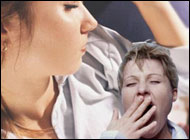Sleep problems may impair truck drivers
Both chronic sleep deprivation and sleep-related breathing problems may make truck drivers a hazard on the road, according to a study published Tuesday.
In a study of more than 400 commercial drivers, researchers found that 13 percent typically slept for less than 5 hours per night, while about 5 percent had severe symptoms of the breathing disorder sleep apnea.
Overall, these drivers were more likely to be sleepy during the day, and many were less alert and had slower reaction times on performance tests, according to results published in the American Journal of Respiratory and Critical Care Medicine.
The findings, say the study authors, suggest that drivers need to be routinely screened for both sleep apnea and for the impaired performance that can come with chronic sleep deprivation.
Obstructive sleep apnea is a disorder in which the tissues at the back of the throat temporarily collapse, causing a brief pause in breathing until the brain rouses the person from deep sleep. This can happen dozens of times during the night, and often leads to poor sleep quality and daytime drowsiness.
In the current study, 28 percent of truck drivers were found to have at least mild sleep apnea, with almost 5 percent having their breathing interrupted 30 or more times per night. It was this latter group that showed signs of excessive daytime sleepiness, being more likely than drivers without sleep apnea to fall asleep within 5 minutes of hitting the pillow.
Similarly, drivers who normally slept less than 5 hours per night were more likely to be exhausted during the day, and they performed more poorly on tests of alertness and reaction than their better-rested counterparts.
“Both of these problems are very common in commercial drivers,” said Dr. Allan I. Pack, the study’s lead author and the director of the Center for Sleep and Respiratory Neurobiology at the University of Pennsylvania in Philadelphia.
“The good news,” he added, “is that both can be helped.” 
This is important, Pack said, because drowsy driving is a major cause of collisions involving commercial vehicles. An estimated 5,600 Americans are killed every year in such crashes.
Pack and his colleagues believe that truckers should routinely be screened for sleep apnea during their periodic medical evaluations. It’s harder to determine whether drivers are just sleep-deprived, Pack said, but they could be required to undergo tests like those used in the study to spot signs of impaired performance.
It’s also important, he noted, to educate drivers, as well as their spouses, on the importance of sufficient sleep.
People vary in how much sleep they need to be alert during the day, Pack said, and not every driver who clocked less than 5 hours per night was impaired on tests. But research shows that, on average, adults need about 8 hours sleep per night, Pack said.
SOURCE: American Journal of Respiratory and Critical Care Medicine, August 2006.
Revision date: July 9, 2011
Last revised: by Andrew G. Epstein, M.D.